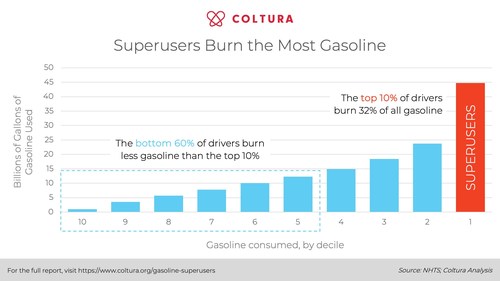SEATTLE, July 20, 2021 /PRNewswire/ — New research finds that converting the biggest users of gasoline to EVs in the next ten years is critical to reaching President Biden’s climate goals and that present EV policies are poorly suited to shifting them. Published today by Coltura, the report, "Gasoline Superusers," provides the first in-depth look at the data available on drivers in the top 10% of gasoline consumption, so-called "gasoline superusers." It analyzes EV incentives and other policy options for transitioning superusers to EVs and presents a model for achieving significant cuts in gasoline consumption by 2030.
"This is the first published study identifying the demographic characteristics of gasoline superusers and calling for EV incentive programs and other policies to focus on maximizing gasoline displacement. Getting gasoline superusers into EVs as quickly as possible is critical to hitting our climate goals because they consume a third of U.S. gasoline," said Matthew Metz, the lead author of the report and founder and co-executive director of Coltura, a nonprofit working to accelerate the transition from gasoline to cleaner alternatives.
"The current flat EV incentives are being used primarily by higher-income drivers who tend not to use much gasoline," added Janelle London, co-author of the report. "The people who use the most gasoline are more evenly spread across the income spectrum, and many lower-income gasoline superusers spend upwards of 20% of their household income on gasoline. It’s more equitable as well as more efficient to give these drivers the biggest incentives to switch to EVs."
Top "Gasoline Superuser" Report Findings:
- Drivers are highly unequal in their gasoline consumption. The drivers in the top 10% of gasoline consumption each use upwards of 1,000 gallons of gasoline each year. Collectively they burn nearly one-third of all U.S. gasoline consumed in the U.S. by light duty vehicles. This is more than the bottom 60% of users combined.
- Current EV and clean vehicle policies are inadequate to achieve Biden Administration and IPCC climate goals.
- Revising EV incentives to focus on displacing gasoline consumption will:
- Cut gasoline use faster, more efficiently, and at a lower cost.
- Require fewer EVs to achieve the same level of carbon reduction as existing policies.
- Improve equity.
- Revising EV policy to focus on the biggest gasoline users will shift focus to rural, lower and middle-income drivers and away from the wealthier people on the West Coast and in the Northeast who have historically taken most advantage of EV incentives.
- Converting gasoline superusers to EVs requires marketing strategies that reflect an understanding of superusers’ distinct beliefs and feelings about gasoline and electric cars.
- Incentivizing the sale of EVs to superusers will motivate automakers to build models preferred by superusers.
- Gasoline superusers drive three times more miles than average, are more likely to drive pickups and SUVs, and are more likely to live in rural areas.
- Louisiana, Wyoming, and Mississippi are the states with the highest concentration of superusers, while Houston, Detroit, St. Louis have the highest concentration of superusers among U.S. metro areas.
- Understanding gasoline consumption patterns is key to effective EV policies and understanding the real-world impact of EV adoption on CO2 emissions.
The findings of this report, modeled in part from data published in the most recent National Household Travel Survey (NHTS), are instrumental for policymakers to design incentive programs and other policies that maximize reductions in gasoline use and address infrastructure requirements to meet the needs of gasoline superusers.
The full report is available at https://www.coltura.org/gasoline-superusers.
About Coltura
Coltura is working to improve climate, health, and equity by accelerating the transition from gasoline and diesel to cleaner alternatives. It focuses on changing gasoline supply, gasoline demand, and gasoline culture through innovative legal and policy pathways, media, and art. It is leading an effort to put states on a path to requiring vehicles of model year 2030 to be EVs. Learn more at www.coltura.org.
MEDIA CONTACT
Samara Villasenor, Communications for Coltura,
314819@email4pr.com
, 425-255-0890
SOURCE Coltura


